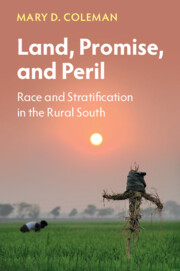Book contents
- Land, Promise, and Peril
- Cambridge Studies in Stratification Economics: Economics and Social Identity
- Land, Promise, and Peril
- Copyright page
- Contents
- Figures
- Tables
- Preface
- Acknowledgments
- Part I The Family in an Intemperate Community, State, and Nation
- 1 Families’ Cross-Century Struggles to Leave Dispossession Behind
- 2 The Sunflower County Delta
- 3 Multigenerational Injury, Insult, and Adversity
- 4 Patterns of Dispossession
- 5 Facing Promise and Peril
- 6 Position-Taking in the Nation
- Part II Family Interiority and Economic Mobility Pathways
- Part III Pathways toward Upward Economic Mobility
- Select Bibliography
- Index
6 - Position-Taking in the Nation
from Part I - The Family in an Intemperate Community, State, and Nation
Published online by Cambridge University Press: 15 April 2023
- Land, Promise, and Peril
- Cambridge Studies in Stratification Economics: Economics and Social Identity
- Land, Promise, and Peril
- Copyright page
- Contents
- Figures
- Tables
- Preface
- Acknowledgments
- Part I The Family in an Intemperate Community, State, and Nation
- 1 Families’ Cross-Century Struggles to Leave Dispossession Behind
- 2 The Sunflower County Delta
- 3 Multigenerational Injury, Insult, and Adversity
- 4 Patterns of Dispossession
- 5 Facing Promise and Peril
- 6 Position-Taking in the Nation
- Part II Family Interiority and Economic Mobility Pathways
- Part III Pathways toward Upward Economic Mobility
- Select Bibliography
- Index
Summary
For several decades before the Civil War, many families, mostly white, were slave rich. In Mississippi, 47 percent of white families owned at least one slave, while, for example, 20 percent of Arkansas white families owned slaves. Slave holding planters, and even those, like John Marshall, who were not planters, resolved the contradiction between advocating for equality and their dependence on slave labor. In a telling biography, Without Precedence, Chief Justice Marshall and his Times, Joel Richard Paul wrote soberly, “Slavery made it possible to regard all white males as equal, regardless of their social status. Tradesmen saw themselves as the social equals of wealthy plantation owners because they were both white. Unlike Europe, where class identity divided rich and poor and posed a constant threat to the social order, in eighteenth–century Virginia, the underclass was all black and mostly enslaved"
- Type
- Chapter
- Information
- Land, Promise, and PerilRace and Stratification in the Rural South, pp. 106 - 148Publisher: Cambridge University PressPrint publication year: 2023

